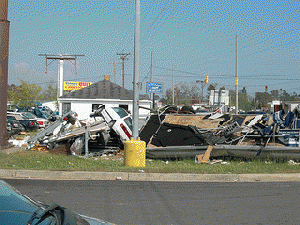Let me begin by saying that victims of disasters--be they human-made or natural-- are just that: victims. Their deaths are always tragic because if nothing else they come too soon. As human beings, their bodies are of equal value and the loss of life is felt by everyone who knows them and loves them.
New Orleans, post-Katrina by USDAgov
That said, we know most vividly from the news coverage and national reaction to Hurricane Katrina that social inequality shapes our perceptions of disasters and our responses to them. During the aftermath of Hurricane Katrina images of poor African Americans streamed into our living rooms through our TVs and along with those images criticism that President Bush's response to Katrina was slowed by racism.
And, if not out-right racism, there is ample evidence that assumptions and stereotypes about the victims of Hurricane Katrina impacted our individual and national responses.
September 8, 2008: Mrs. Bush, after touring the Astrodome complex in Houston on Monday, said: ''What I'm hearing, which is sort of scary, is they all want to stay in Texas. Everyone is so overwhelmed by the hospitality. And so many of the people in the arena here, you know, were underprivileged anyway, so this is working very well for them." She commented during a radio interview with the American Public Media program ''Marketplace." (AP)
There has been much less controversy over the national reaction to the tragedy of 911; probably because of the sheer enormity of the tragedy and the nationalism that it inspired in many if not most Americans. Yet, on the ten year anniversary of 911 my husband and I sat on the couch watching the victims names being read--a very depressing stretch of hours--and paying attention, as scholars of inequality often do--to the race and ethnicity of the 3000 Americans who lost their lives. We were struck by how many people of color and African Americans in particular had died. That wasn't the image that we had collectively created--with the help of the media--of the typical victim.
At the same time we were writing a book on the impact of Obama's election on the African American family and post-racial America and we decided to research some of the media presentations on 911 to see if our hunch was right. Around the 10th anniversary of 911 the Commemorative issue of Time Magazine, entitled "Beyond 9/11: Portraits of Resilience," arrived in our mailbox. Inside the pages of the photo-rich commemorative edition dedicated to the 10th anniversary of the Sept. 11, 2001, terrorist attacks, no African Americans are pictured in its 64 pages.
The past two weeks have been devastating for the state of Oklahoma. Our hearts go out to all of the families there who lost loved ones and whose lives are changed forever by the experience of the tornado and the loss of their property. As the pictures reveal, hundreds of people lost literally everything.
In the last week I've wondered how one moves on from this kind of tragedy. As a well-educated professional, I can't begin to image where one even starts. Does the city hold seminars at the library called "Rebuilding 101: The steps in rebuilding your life and your home?" What access to resources do the victims really have? Many must have to stay in hotels they can't afford, many are probably missing paychecks because the job they held no longer exists. Does FEMA or insurance or disaster funds really help people cover all of these expenses?
Or, does one's social class, race and other factors impact one's ability to rebuild, to move on, is there such a thing as "t he wrong complexion for protection? "
Thinking about all of this took me back to Hurricane Katrina and the anniversary of 911 and I started to realize that the very early coverage of the tornado in Moore, Oklahoma included people of color. But, as the days passed and the coverage grew more intense---literally 24/7 coverage with images streaming into our living rooms once again---I realized that I was seeing images mostly of White people. Where had the people of color gone, I wondered?
So, I did a little research.
In the neighborhood that was most devastated by the tornado, 12.5% of
the population is African American and 72% of the population is White. When I researched the victims, I learned that
11 or 26% of the people who were killed by the tornado were Black, twice the
number we would have predicted if a tornado were really a random event. Do the
black residents of Moore live in the sections most heavily impacted? Do they have less access to safety? This, of course, is a whole other intriguing
issue that will require much more research to explain.
Certainly GOOGLE is not a scientific measure of anything. But, it is an excellent source of the information that is transmitted into the lives of most Americans--via the TV, twitter, facebook, and even online news sources--today most Americans get their news in some way from the internet.
My simple research project revealed quite clearly that the media has a tendency to white wash disasters--with the exception of Hurricane Katrina where the goal seemed to be to paint the victims as having some responsibility for their own conditions.
In any case, it leads me to wonder, what role does the media portrayal of a disaster have on our collective and national response to it? If the lessons from Hurricane Katrina are applicable to other disasters, it suggests that when the media white washes a tragedy the government and the public are more sympathetic toward it and perhaps more likely to respond quickly and appropriately.
(Note: You can view every article as one long page if you sign up as an Advocate Member, or higher).





